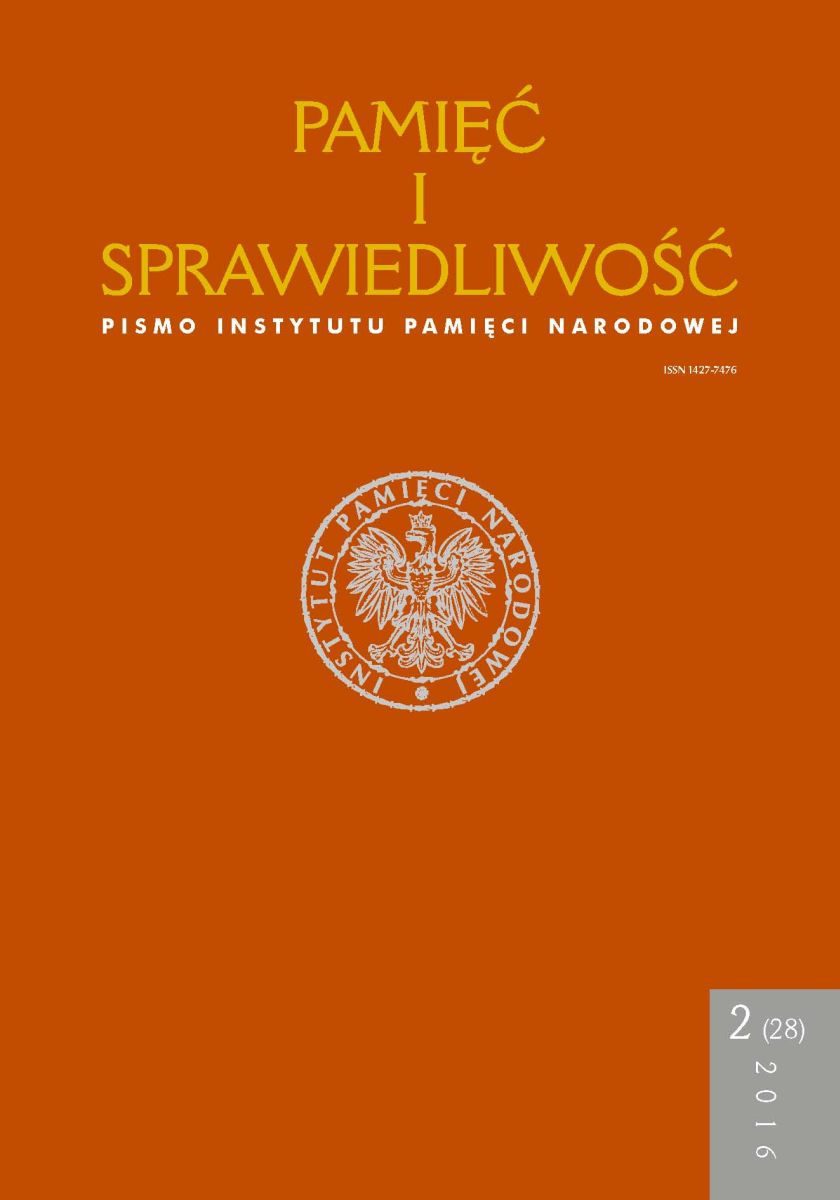In Opposition to Moscow. Yugoslav "Path to Socialism" in the Years 1948-1956
Pamięć i Sprawiedliwość, Tom 28 Nr 2 (2016), strony: 395-417
Data publikacji: 2016-06-30
Abstrakt
Bibliografia
I. Banac, Sa Staljinom protiv Tita, Zagreb 1990.
C. Békés, East Central Europe, 1953-1956 [w:] M.P. Leffler, O.A. Westad, The Cambridge History of The Cold War, Crises and Detente, t.: 1, Cambridge 2010.
D. Bilandžić, Historija Socijalističke Federativne Republike Jugoslavije, Zagreb 1978.
D. Bilandžić, Hrvatska moderna povijest, Zagreb 1999.
Đ. Bilić, Goli otok i Dabravine: logori jugoslavskoga socijalizma, Zagreb 1998.
D. Bogetić D., Jugoslavija između Istoka i Zapada [w:] Dimić L., Jugoslavija u hladnom ratu. Prilozi istraživanjima, Beograd 2010.
D. Clissold, Djilas. The Progess of a Revolutionary, Hugh Seton-Watson 1983.
V. Dedijer, Dokumenti 1948, knjiga prva, Beograd 1979.
L. Dimić, Josip Broz, Nikita Sergejevič Hruščov i Mađarsko pitanje 1955–1956, „Tokovi Istorije” Beograd 1998, nr 1–4.
M. Đilas, Vlast i pobuna, Zagreb 2009.
M. Đorgović, Đilas heroj-antiheroj, Podgorica 2006.
M. Đorgović, Đilas Vernik- jeretik, Beograd 1989.
A. Edemskiy, Tito and Khrushchev after the 20th Party Congress: The New Nature of Yugoslav-Soviet Relations [w:] C. Fink, F. Hadler, T. Szramm, 1956: European and Global Perspectives, Leipzig 2006
L. Gibianskii, Federative Projects of the Balkan Communists and the USSR Policy during Second World War and the Beginning of the Cold War [w:] V. Pavlović, The Balkans in the Cold War. Balkan Federations, Cominform, Yugoslav-Soviet Conflict, Belgrade 2011.
I. Goldstein, Povijest Hrvatske, Zagreb 2008.
N. Golubović, Nikola: Moje nemjerljivo blago – svjedočanstvo o Petrovoj rupi na Golom otoku, Beograd 2013.
T. Jakovina, Američki komunistički saveznik. Hrvati, Titova Jugoslavija i Sjedinjene Američke Države 1945.-1955., Zagreb 2003.
T. Jakovina, To nije bio moj komunizam iako je bila moja prošlost- razgovor s poljskim povjesničarem Andrzejom Paczkowskim, „Historijski zbornik” Zagreb 2003, nr 35.
T. Jakovina, Treća strana hladnog rata, Zagreb 2011.
B. Jandrić, Hrvatska pod crvenom zvijezdom. Komunistička partija Hrvatske 1945.-1952., Zagreb 2005.
R. Jervis, Identity and the Cold War [w:] M.P. Leffler, O.A. Westad, The Cambridge History of The Cold War, Crises and Detente, t.: 1, Cambridge 2010.
D. Jović, Yugoslavism and Yugoslav Communism: From Tito to Kardelj [w:] D. Djokić, Yugoslavism. Histories of a Failed Idea 1918-1992, Madison 2003.
E. Kardelj, Sećanja-Borba za priznanje i nezavisnost nove Jugoslavije, Ljubljana-Beograd 1980.
K. Kovačević, Jugoslavija i mađarska kriza 1956. godine [w:] L. Dimić, Jugoslavija u hladnom ratu. Prilozi istraživanjima, Beograd 2010.
R.E. Kullaa, Origins of the Tito-Stalin Split Within the Wider Set of Yugoslav-Soviet Relations (1941-1948) [w:] V. Pavlović, The Balkans in the Cold War. Balkan Federations, Cominform, Yugoslav-Soviet Conflict, Belgrade 2011.
J. R. Lampe, Yugoslavia as History. Twice there was a country, Cambridge 1996.
D. Marković, Istina o Golom otoku, Beograd 1987.
V. Mastny, Soviet foreign policy, 1953-1962 [w:] M.P. Leffler, O.A. Westad, The Cambridge History of The Cold War, Crises and Detente, t.: 1, Cambridge 2010.
M. Maticka, Agrarna reforma i kolonizacija u Hrvatskoj 1945.-1948., Zagreb 1990.
D. Mihailović, Kratka istorija satiranja, Beograd 2005.
G. Miloradović, Staljinovi pokloni – Tematika jugoslavenskog igranog filma 1945.-1955., „Istorija 20. veka”, Beograd 2002,nr 1.
V. Pavlović, Stalinism without Stalin. The Soviet Origins of Tito's Yugoslavia 1937-1948 [w:] V. Pavlović, The Balkans in the Cold War. Balkan Federations, Cominform, Yugoslav-Soviet Conflict, Belgrade 2011.
M. Previšić, Broj kažnjenika na Golom otoku i ostalim logorima za informbiroovce u vrijeme sukoba sa SSSR-om (1948.-1956.), „Historijski zbornik” Zagreb 2013, nr 1 (66).
M. Previšić, Povijest informbiroovskog logora na Golom Otoku 1949. – 1956.(Praca doktorska obroniona w lipcu 2014 r. na Wydziale Filozoficznym Uniwersytetu w Zagrzebiu).
J. Pirjevec, Tito i drugovi, Zagreb 2012.
S. Rajak, The Cold War in the Balkans, 1945-1956 [w:] M.P. Leffler, O.A. Westad, The Cambridge History of The Cold War, Crises and Detente, t.: 1, Cambridge 2010.
D. Rusinow, The Yugoslav Experiment 1948-1974, Berkley and Los Angeles 1977.
J. Rychlik, Następstwa XX Zjazdu KPZR w krajach Europy Środkowej i Wschodniej. Podobieństwa i różnice [w:] J. Szymoniczek, E. C. Król Rok 1956 w Polsce i jego rezonans w Europie, Warszawa 2009.
M. Sokulski, Jugoslovenska politika prema zemljama Trećeg sveta 1956.-1961. godine iz perspektive ambasade Narodne Republike Poljske u Beogradu [w:] M. Pavlović, A. Zaćmiński, D. Bondžić, Jugoslovensko-poljski odnosi u XX veku, Beograd 2015.
M. Sokulski, Poljska kultura 1948-1956 iz perspektive Veleposlanstva Jugoslavije u Varšavi kao izraz legitimizacije vlastitog režima, „Historijski Zbornik”, Zagreb 2014, nr 2 (67).
M. Sokulski, Rok 1956 w Polsce w raportach Ambasady Federacyjnej Ludowej Republiki Jugosławii w Warszawie [w:] Letnia Szkoła Historii Najnowszej 2013. Referaty, pod red. Ł. Kamińskiego i A.M. Adamus, Warszawa 2014.
R. Spałek, Komuniści przeciwko komunistom : poszukiwanie wroga wewnętrznego w kierownictwie partii komunistycznej w Polsce w latach 1948-1956, Warszawa 2014.
M. Stevanović, U Titovim fabrikama izdajnika, Beograd 1991.
J. Tebinka, Uzależnienie czy suwerenność? Odwilż październikowa w dyplomacji Polskiej Rzeczypospolitej Ludowej 1956-1961, Warszawa 2010.
A. Ulam, The Soviet Union and the Rules of the International Game [w:] London K., The Soviet Union in World Politics, Colorado-London 1980.
Inne teksty tego samego autora
- Mateusz Sokulski, Reakcje społeczeństwa jugosłowiańskiego na powstanie i rozwój Solidarności 1980–1981. Jugosławia początku lat osiemdziesiątych. Czas przemian , Pamięć i Sprawiedliwość: Tom 35 Nr 1 (2020)
- Mateusz Sokulski, [Recenzje] Slobodan Selinić, Jugoslovensko-Čehoslovački odnosi 1945–1955, Institut za Noviju Istoriju Srbije, Beograd 2010 (Biblioteka „Studije i Monografije”, t. 59), ss. 715 , Pamięć i Sprawiedliwość: Tom 20 Nr 2 (2012)
- Mateusz Sokulski, Historiografia serbska i chorwacka poświęcona polityce zagranicznej Jugosławii w okresie zimnej wojny , Pamięć i Sprawiedliwość: Tom 22 Nr 2 (2013)
 Język Polski
Język Polski
 English
English
 Deutsch
Deutsch
 Français (France)
Français (France)
 Italiano
Italiano
 Русский
Русский


 PDF
PDF
